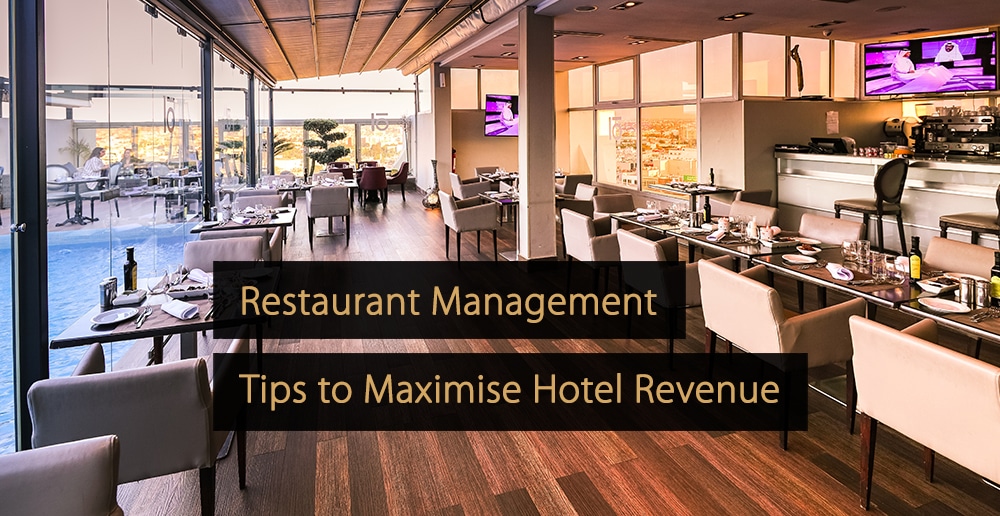Hotel restaurant management presents some unique challenges. As well as providing food, your hotel’s restaurant is an intrinsic part of a guest’s experience. An excellent restaurant can help make staying at your hotel memorable. If your hotel restaurant is open to the general public, it can also be an important additional revenue source. In this article, you’ll discover valuable tips for maximizing hotel restaurant revenue.
Table of Contents:
- What Is the Hotel Industry?
- What Is a Hotel Restaurant?
- What Is Hotel Restaurant Management?
- What Is Hotel Restaurant Management Degree?
- Why Is Hotel Restaurant Management Different from Regular Restaurant Management?
- Tips for Successful Restaurant Management
- Make Sure the Restaurant Is Family Friendly
- Create a Beautiful Hotel Breakfast Experience
- Recruit the Right People
- Make Sure to Offer Room Service
- Make Sure You Target Correct In-house and Outside Guests
- Prioritise Customer Service
- Choose the Correct POS System
- Be Consistent
- Make Sure to Give VIP Treatment to Hotel Guests and Local Regulars Alike
- What Other Hotel Departments Work Together with the Hotel Restaurant?
- Hotel Restaurant Trends
What Is the Hotel Industry?
The hotel industry has existed for millennia, from simple inns and lodgings in antiquity to today’s high-tech luxury resorts. The hotel industry is part of the wider hospitality industry, specifically the segment concerned with providing overnight accommodation to customers.
The industry is vast, spanning the globe and engaging in crucial economic activity. As well as providing an important service for consumers, the hotel industry provides careers for countless people worldwide. The hotel industry offers entry-level roles for housekeeping and kitchen staff and opportunities in hotel marketing, hotel finance, hotel restaurant management, and other diverse roles.
For an in-depth look at the hotel industry, read “Hotel Industry: Everything You Need to Know About Hotels!” You’ll gain valuable insights into the industry, such as tips for finding the best hotel staff, trends in hotel technology, and the top hotel schools worldwide.
What Is a Hotel Restaurant?
Hotel restaurant management is a hybrid of running an eatery and caring for hotel guests. What makes a hotel restaurant special is its effect on a hotel guest’s stay. If a diner enjoys their experience, it affects a single evening.
A truly outstanding hotel restaurant can help shape guests’ impression of their entire stay. Guests may eat three meals a day at a hotel restaurant and order light snacks or room service. As well as impressing guests, quality hotel restaurants can also be a draw for diners who aren’t staying at your hotel.
What Is Hotel Restaurant Management?
Managing a hotel restaurant is an intricate operation. Providing food and beverages within a hotel setting requires an awareness of how the restaurant affects other hotel departments. While it’s similar to managing other businesses in the restaurant industry, hotel restaurant management has some distinct differences.
Hotel restaurant management typically involves multiple hotel team members, each contributing to optimal management functionality. A range of factors is important for any restaurant, from safety in the kitchens and dining area to efficient inventory management.
Quality customer service is one of the most important aspects of restaurant management in a hotel setting. Of course, this is important for any business in the hospitality industry; however, customer service becomes even more important in a hotel context. Managing a hotel restaurant means keeping guests happy when they dine with you.
Video: Hotel and Restaurant Operations Management
What Is Hotel Restaurant Management Degree?
A hotel restaurant management degree is a formal qualification. It is designed to prepare students for management roles in hotels and restaurants and is also relevant to other businesses in the hospitality industry. Graduates in hotel and restaurant management may go on to work at casinos, spas, resorts, and other hospitality-related enterprises.
The exact curriculum can vary between degree programs but will typically cover topics such as food and beverage control, organizing events, business and accounting, managing staff, and more. Many institutions offer more specialized degrees in the field, such as programs focusing on travel and tourism or meetings and events.
The course will often include practical experience, such as an internship. This is very useful in giving students hands-on experience in the field and providing insight into which aspects will provide the most job satisfaction.
Why Is Hotel Restaurant Management Different from Regular Restaurant Management?
A hotel restaurant has similar requirements to other food service outlets but will also perform other functions that stand-alone restaurants don’t. A hotel restaurant may be required to fulfill room service orders around the clock, meaning the restaurant must be staffed 24 hours a day.
Instead of being served in a single dining room, guests may require service from multiple points: their rooms, the hotel’s lobby, and exterior locations like a terrace or poolside seating. The restaurant may need to provide various dining options, including locally sourced ingredients and regional dishes. As well as travelers, the restaurant may also need to attract local diners.
Guests may wish to dine in different venues, including ones open late. A hotel restaurant may need to manage food and beverage tabs to be cleared when guests check out. The restaurant management must collaborate with other departments to meet shared business goals.
Tips for Successful Restaurant Management
In this section, you’ll discover useful tips to impress guests, improve the efficiency of your restaurant marketing strategy, and optimize revenue from hotel restaurants.
Make Sure the Restaurant Is Family Friendly
Unless your hotel has a lower age limit, many guests will be families with children of all ages. While your restaurant may be elegant and refined, it should also be welcoming for diners with young children. Providing booths for cozy family meals, offering booster seats, and having a dedicated children’s menu can all help families feel welcome.
Families with children may want to eat earlier in the day than adults, and offer options for brunch and early evening meals. Simple items to help keep children occupied, such as coloring pages, can make dining more peaceful for other guests.
Create a Beautiful Hotel Breakfast Experience
It’s often said that breakfast is the most important meal. Setting your guests up with a delicious and satisfying breakfast every morning is important. This helps them to get the day off to a good start and creates a positive impression.
Whether your guests are preparing for a busy day of sightseeing and shopping or having a working breakfast before heading to a conference, they will appreciate a range of tasty breakfast options. To learn more about hotel breakfasts, read “Hotel Breakfast: Types, Overview & Tips to Impress Your Guests”.
Recruit the Right People
One of the most important aspects of hotel restaurant management is recruiting the right staff for your business. Selecting staff for the hotel restaurant team is as crucial as recruiting the right staff for any other public-facing role in a hotel. As well as appropriate qualifications and experience in a restaurant setting, you should look for staff with experience in the hotel industry.
Staff will need to be a good fit for your hotel’s culture and possess personal characteristics that will lend themselves to the role. These staff will probably be interacting with each guest on multiple occasions, so they need to make a great impression every time.
Make Sure to Offer Room Service
Offering room service for overnight guests presents challenges for hotel restaurant management, but it can leave a favorable impression on guests and provide additional revenue. To ensure that guests are satisfied without compromising efficiency, limiting the range of items available on the room service menu is a good idea.
Select menu items that are easy to deliver, and consider limiting room service to specific times. Ensure sufficient trays and carts are available to facilitate delivery and task staff with checking the halls for empty trays.
Make Sure You Target Correct In-house and Outside Guests
Targeting the right markets is important for any restaurant and presents additional challenges for hotel restaurants. A standalone restaurant can focus on appealing to a particular segment of customers in the local area. In contrast, a hotel restaurant must curate a menu that attracts local diners and satisfies the needs of its diverse guests.
This can be a difficult balance to strike. In “Choosing the Right Target Market for a Restaurant To Ensure Success”, you’ll find important tips on attracting customers, establishing a brand, and building the reputation of your hotel restaurant.
Prioritise Customer Service
Each member of your restaurant staff will likely have many interactions with any given guest throughout their stay. You should pay as much attention to good customer service in your hotel restaurant as you would to any other customer touchpoint in a hotel.
Customers are likely to interact more frequently with restaurant staff than with the front desk staff. This means that restaurant staff may have a bigger impact on a guest’s perception of the hotel than those who are usually seen as the “face” of the establishment.
Choose the Correct POS System
POS (point of sale) systems can streamline a hotel’s operations and enhance a customer’s experience. Modern POS systems are increasingly sophisticated and can perform various functions, over and above simply processing sales. They’ve become widely used in the hospitality industry thanks to their ability to collect data, help with inventory and revenue management, and make life easier for guests.
In “POS Systems: Overview and Importance in the Hospitality Industry”, you can learn more about the different kinds of restaurant POS systems, their role in the hospitality industry, and how to choose the right POS for your needs.
Be Consistent
Consistent excellence in the customer experience is an important feature of good hotel restaurant management. The experience offered by your restaurant should align with the standard of the hotel itself. Remember that visitors to your restaurant often expect more customer service than they might receive at a standalone restaurant.
Note that if visitors to your restaurant have a positive dining experience, they’re more likely to recommend the hotel to incomers and stay there themselves in the future. Your restaurant’s customer relationship management (CRM) systems should be integrated with your hotel’s CRM to ensure customer data quality and consistent personalization.
Make Sure to Give VIP Treatment to Hotel Guests and Local Regulars Alike
All of your restaurant guests should receive high-quality customer service. In the case of guests staying at the hotel, it’s worth going the extra mile. It’s a good idea to reward them with VIP treatment. The same goes for regular diners from the area.
Loyal diners should be rewarded with additional consideration from staff, such as making a favorite table available, remembering which foods they prefer, and offering complementary items. Local visitors who receive VIP treatment are more likely to continue visiting your restaurant and can provide valuable revenue when the hotel is quiet.
What Other Hotel Departments Work Together with the Hotel Restaurant?
Part of hotel restaurant management is working effectively with the other departments within the hotel. Cooperating with other departments allows your restaurant to operate efficiently and offer the best possible guest experience. The hotel restaurant forms part of the food and beverage department but will also interact with the other departments, like finance and human resources.
In “Hotel Departments: Learn About All the 7 Sections of a Hotel”, you’ll gain important insights into the different hotel departments. You’ll learn the functions of each hotel section, from housekeeping and maintenance to reservations and marketing, and how they make up a cohesive whole. You’ll also learn about essential software for successful hotel operations and its relevance to hotel restaurant management.
Hotel Restaurant Trends
Hotel restaurant management involves staying up to date with the latest trends in the industry. That includes trends in restaurant marketing and restaurant technology. Ensuring that your restaurant has the best possible advertising and brand-building can significantly impact the hotel’s revenue overall.
As the industry emerges from the shadow of COVID, people are ready to seek out new dining experiences. Your hotel restaurant might be exactly what they’re looking for. In “Restaurant Advertising Trends You Should Know About”, you’ll learn about the latest trends in the restaurant industry and new ways to market your restaurant.
Hotel Restaurant Management FAQs
The hotel restaurant is an important hotel feature, not only as a place for guests to eat but as an attraction for local diners. Hotel restaurant management requires excellent customer service and integration with other hotel departments.
More Tips to Grow Your Business
Revfine.com is the leading knowledge platform for the hospitality and travel industry. Professionals use our insights, strategies, and actionable tips to get inspired, optimize revenue, innovate processes, and improve customer experience.Explore expert advice on management, marketing, revenue management, operations, software, and technology in our dedicated Hotel, Hospitality, and Travel & Tourism categories.
This article is written by:
Hi, I am Martijn Barten, founder of Revfine.com. With 20 years of experience in the hospitality industry, I specialize in optimizing revenue by combining revenue management with marketing strategies. I have successfully developed, implemented, and managed revenue management and marketing strategies for individual properties and multi-property portfolios.









Leave A Comment